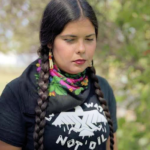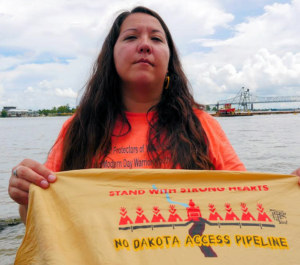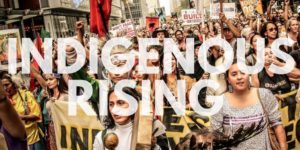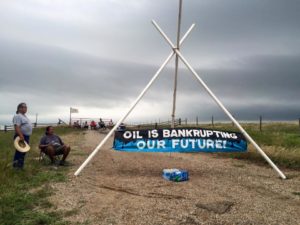FOR IMMEDIATE RELEASE
September 27, 2016
Media Contact:
Jade Begay, jade.begay@gmail.com, +1 (505) 699-4791
Cannon Ball, North Dakota (27 Sept. 2016) – Women of the Standing Rock Sioux people and Indigenous women allies from across North America (Turtle Island) stand on the front-line of ongoing actions to halt construction of the Dakota Access Pipeline and protect land, water, community, sacred sites and lifeways.
The women protectors stand for their homelands, for their children, and for the health and lives of generations to come.
In recognition of the central role played by Indigenous women taking action to stop Dakota Access Pipeline in solidarity with the Standing Rock Sioux peoples, women leaders will gather to share their experiences, demands and calls to action during a press conference to be held on the ground at the Oceti Sakowin camp near Cannon Ball, North Dakota.
They will speak to vital topics including the impacts of fossil fuel extraction on women; violence against women and violence against the Earth; and women’s leadership in the fight to stop Dakota Access Pipeline.
Press conference sponsors include the Indigenous Environmental Network, Oceti Sakowin Camp, International Indigenous Youth Council, Camp of Sacred Stones and Honor the Earth, with support from the Women’s Earth and Climate Action Network (WECAN) International and World March of Women, US Chapter.
What: No Dakota Access – Indigenous Women Protectors Press Conference
When: Wednesday September 28th, 2016 at 3:00 PM Central
Where: Media tent, Media hill, Oceti Sakowin camp, North Dakota – live stream available via the Indigenous Environmental Network Facebook page
 “The effects of the fossil fuel industry are not limited to the environment. There is a very real human cost that is disparately felt by people of color, and women in particular. When a new extraction project is proposed, the local community bears the brunt of increased violent crime, disappearances, and trafficking. Women are the water protectors, life givers, and backbones of indigenous communities. Our lives and our bodies matter more than a profit margin,” said Tara Houska (Anishinaabe, Couchiching First Nation), the National Campaigns Director of Honor the Earth.
“The effects of the fossil fuel industry are not limited to the environment. There is a very real human cost that is disparately felt by people of color, and women in particular. When a new extraction project is proposed, the local community bears the brunt of increased violent crime, disappearances, and trafficking. Women are the water protectors, life givers, and backbones of indigenous communities. Our lives and our bodies matter more than a profit margin,” said Tara Houska (Anishinaabe, Couchiching First Nation), the National Campaigns Director of Honor the Earth.
“Indigenous Women feel the impacts directly of the aggressive resource extraction industry, with man camps, with criminalizing Indigenous land defenders, and the toxic pollution that finds its way to our womb, breast milk and babies. The attack on our bodies is violence against women,” explained Kanahus Manuel (Secwepemc and Ktunaxa peoples).
 “When fracking came to my communities on the Fort Berthold Reservation in the Bakken shale oil fields of North Dakota the increase in violence against women was horrendous and unimaginable. Rapes, sex trafficking, kidnapping and deadly drug abuse all came with the oil boom. What we see clearly is that the rape and pillage of our mother earth goes hand in hand with the rape and pillage of our women and it has got to stop. There is a better way for us to live upon this planet and that way can be achieved through a Just Transition away from the fossil fuel industry and by keeping fossil fuels in the ground.” explained Kandi Mossett, Lead Organizer on the Extreme Energy and Just Transition Campaign with the Indigenous Environmental Network.
“When fracking came to my communities on the Fort Berthold Reservation in the Bakken shale oil fields of North Dakota the increase in violence against women was horrendous and unimaginable. Rapes, sex trafficking, kidnapping and deadly drug abuse all came with the oil boom. What we see clearly is that the rape and pillage of our mother earth goes hand in hand with the rape and pillage of our women and it has got to stop. There is a better way for us to live upon this planet and that way can be achieved through a Just Transition away from the fossil fuel industry and by keeping fossil fuels in the ground.” explained Kandi Mossett, Lead Organizer on the Extreme Energy and Just Transition Campaign with the Indigenous Environmental Network.
“We are a delegation of women of color and two-spirit leaders from across the country who have come to support Standing Rock. Women’s survival is deeply connected to the health of the land and water. We named ourselves after slain Honduran Indigenous water protector Berta Caceres because she embodies the type of inter-sectional leadership our movement needs; Indigenous, feminist, water protectors, human rights defenders – which is exactly the leadership we are seeing here at Standing Rock.” explained Helena Wong, National Organizer with the World March of Women, US Chapter.
Indigenous women leaders are available continuously for interviews on the ground at Standing Rock and via phone and computer. The press conference will be live-streamed via the Indigenous Environmental Network Facebook page.
###




